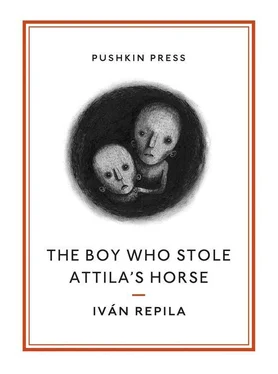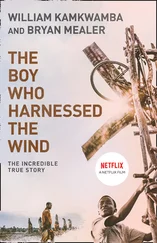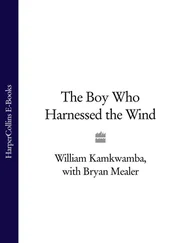‘Today might be the eve of my self.’
Skeletal, unmoving and shamefully underfed, he cannot collect food like before, and now his brother undertakes this role, with the determination of a father. A sensation of bestiality governs them. The hunger in Small’s stomach is so intense it rumbles like thunder and Big plugs his ears with two lumps of clay, modelled from earth and damp weeds, so as not to hear him. He only removes the earplugs for a couple of hours a day in the hope of hearing any noise in the forest that might signal help. But every night, driven half mad by the scandal going on in his brother’s intestines, he puts them back, visibly saddened. He knows that with the earplugs in not only does he smother Small’s voices, but also that crusted layer of guilt that he carries, and which eats away at him.
Small asks unnecessary questions:
‘Why are we here?’
‘Is this the real world?’
‘Are we really children?’
Big never answers.
‘YOU SHOULD KNOW, brother, that I am the boy who stole Attila’s horse to make shoes out of his hooves, and in that way ensure that wherever I set foot the grass would no longer grow. The vilest of men fear me, as they fear the scourge of the gods, because I dried out their land and their seed in my vast wanderings across the world.’
‘Did you do it alone?’
‘With the Huns.’
‘Who are the Huns?’
‘Attila’s soldiers. When he died many of them tore pieces of flesh from themselves. I’m also missing pieces of flesh, only you can’t see because they’re missing from the inside.’
Big sighs and puts his earplugs back in. His brother has fallen into one of his trances, more frequent of late, in which he doesn’t seem to know who he is or where he has come from. The night before he spoke for a long time about human nature, explaining that men were marine beings before becoming land animals; he argued that for this reason it is important to look at the sea, because in doing so mankind can return to the origin of its species.
Later he took it upon himself to describe in the finest detail how certain feelings appear as he sees them in his mind. He arrived at some unbelievable conclusions, such as: the structure of hate is pyramidal and rotatory; or that boredom has a viscous inconsistency. Last thing before going to sleep he announced that every number could correspond to a word, and that one day he would be capable of expressing himself only through numbers. Those hellish monologues were unbearable for Big, since they confirmed the enormous, likely irreparable damage caused to his little brother by the fevers and deprivation.
‘At first my feet hurt. I had to scoop out the insides of the hooves with a spoon and later stick them together with strips of black hide so that when I walked my feet could bend. They smelled like the shell of a dragon’s egg, or like the skull of an idol. And they hurt my feet a lot, so much so that my heels bled and the nails came away from my toes. But when I got used to it I began to walk all over wearing the hooves, and I crossed entire lands that later turned to deserts. People ran away from me and I was happy. When I covered the same ground twice it went black. I walked for years all over the world, and you could see the footsteps of my pilgrimage from the sky like a dreadful wound that wouldn’t heal.
‘Then I wanted to find out what might happen if, instead of walking in my shoes over paths and forests, I walked over people. I chose a camp where everyone was sleeping and I jumped from body to body in a game of bouncy hopscotch. At first nothing happened, but later they began to wake up, screaming and vomiting, their skin shrivelling up like grapes which left yellow stains on the floor. Their bodies turned brown and red. It looked like a poor man’s rainbow: lustreless, born out of a candle and a puddle of urine. I felt important, like a painter. I noticed that the adults dried out quicker than the children, and that the children didn’t weep when they saw death approaching, but received it peacefully, understanding it. I continued along my way, crushing towns and races, and I know that an entire language fell out of use because I jumped excitedly — excited enough to nearly cause myself an injury — on the last man who spoke it.
‘When I grew old, a few years ago, I took off my shoes for the first time since I was a boy, and I saw that my feet were still small. They were clean, unmarked; they even smelled good. I placed the shoes in a golden box, which I placed in a silver box, which I placed in a bronze box, and I buried them in a well in the forest that is half a day’s distance from my old house, and in there I left two of my children so that nobody could ever take them away.’
SOME NIGHTS Big finds he cannot sleep, whether for the nightmares tangled up with painful memories, or because of his quiet dreads, fuelled by the forest’s sounds and the thick air of the darkness. Having now spent over five weeks in the well, insomnia is just another routine in the small and ridiculous perimeter of his life. It’s natural, he thinks, for men to lose the ability to sleep when their world is becoming choked up. That’s why revolutions by injured peoples take place at night, like plagues.
In restless moments like these, he lies on his back and counts the stars. Alert to any little sign of flight or breath or moan, he has no other means to bring on sleep. Nor does he want to disturb his brother’s rest; fragile, like the skeleton of a butterfly.
And so it is that in the distance, with ears so wide they could hold an ocean, he hears branches bending, then the sound of fumbled walking through the forest shrubs and potholes, followed by a few hovering steps on tiptoe which, on arriving at the mouth of the well, stop and turn — first one then the other, agile and devious like fox feet — edging towards a lookout onto a cage of children.
Big does nothing. He doesn’t move, or speak, or breathe. He just listens so that he can fix his eyes on the exact spot. His pupils are so large they could make out the very eyelids of a crow as it circled the moon. He knows where to look:
There.
A head appears and looks down inside the well.
Big knows the features of that face.
Someone returns his gaze.
Then, no one.
Big remains silent, though his breathing has quickened and his heart is pumping acid. He locks his jaw hard, grinding his teeth and making the nerves in the gums between his teeth ring. It’s a pleasant kind of pain, which suppresses the scream building up inside him. A scream like a lump of food in the stomach after a heavy meal.
And willing the wind to carry consonants and vowels across the night, and for his words to penetrate further than any scream could reach, he whispers:
‘I’m going to kill you.’
BIG HAS HIS CLAY EARPLUGS in and he can’t hear the shouts coming from his brother, but he senses a change of direction in the air streams around him. When he turns around he finds Small scratching his arms, eyeballing him like a lunatic and opening his mouth in desperation. Big takes out the earplugs and listens:
‘Dungo sat! Dungo was goswun!’
Big doesn’t understand. He thinks it must be another of his brother’s deliriums and goes to put his earplugs in again. Small, though, stops him with a shove and goes on shouting, pointing at his throat with trembling hands.
‘Nu wemee? Wemee bunder? Dungo was menhaman! Menitimo!’
The urgency in Small’s voice is a sign that something is not right. It isn’t a delirium. It’s as if he had just learnt to speak. Like when one cuts a piece of paper into strips and tries to put them back together but can’t form a rectangle, only a misshapen page.
Читать дальше












